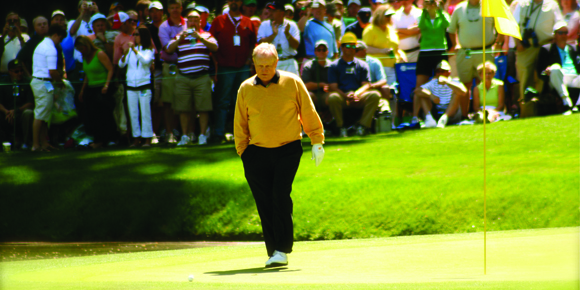As we rip off the March calendar sheet and April appears, it’s nice to realize that we're now making significant progress towards Spring. So, as we chug on through early spring, here are a few past and present stops on the April calendar.
• April 6 to 9 — The Masters Golf Tournament amid the magnolias of Augusta. For hackers, this is the Holy Grail of fairway frustration, and it seems even more special as the spring glory of Augusta comes to us just as our long-awaited golf season finally bursts forth here at home.
The idea for Augusta National originated with Bobby Jones, who wanted to build a golf course after his retirement from the game. He sought advice from Clifford Roberts, who later became the chairman of the club. They came across a piece of land in Augusta, Georgia, of which Jones said: “Perfect! And to think this ground has been lying here all these years waiting for someone to come along and lay a golf course upon it.”
The land had been an indigo plantation in the early 19th century and a plant nursery since 1857. Jones hired Alister MacKenzie to help design the course and work began in 1931. The course formally opened in 1933, but MacKenzie died before the first Masters tournament was played.
Sadly, this year, we will be without Arnie at the Masters. Palmer died in September at 87. He had four Masters green jackets, won seven majors and was the main reason many of us took up the game.
Here’s a trivia quiz to get you in the mood for the Masters (answers at the end of the column):
1. How many players have won consecutive Masters and who are they?
2. Only one player has won two Masters playoffs. Who would that be?
3. Continuing this theme: who is the only player to have lost two Masters playoffs?
4. When was the first Masters, who won and what is “the shot heard ’round the world?”
• April 10 — Passover.
• April 14 — Good Friday.
• April 22 — Earth Day. This is the annual reminder that we should be taking better care of our environment lest we wake up some day in a global-garbage-dump from which there’s no possible recovery. So, among the many things to think about are, “re-use, repair, recycle and reject.” That last one referring to shopping wisely and avoiding ecologically-unfriendly products.
Here are a couple of environmental thoughts to ponder on Earth Day, or any day:
• Every metric tonne of paper recycled saves 17 trees from being cut down.
• Recycled cardboard makes its way back onto the store shelf in the form of a cereal box in as little as three weeks.
• Aluminum cans are recycled into lawn chairs, screen doors, pie plates, car parts and, of course, more aluminum cans.
• Of all your household waste, approximately one-third can be composted.
• It takes a tin can 100 years to break down to dust, an aluminum can 500 years and a glass bottle one million years. A plastic bottle lasts forever.
• Energy saved from recycling one aluminum can is enough to run your TV for three hours.
• Recycled plastics are turned into polyester fibres for carpeting, ski jackets, clothing, sleeping bags and plastic lumber.
• April 22 — Earth Day happens to coincide with one of the eight meteor showers that we’re periodically treated to each year. This one is the Lyrids shower and for a few days on either side of the 22nd. If Mother Nature co-operates with clear skies, you should see a higher-than-average number of meteors streaking by.
• April 30 — The infamous income tax deadline.
It was an old financial sage who said: “Live your life so that, if the mail brings a letter from Canada Revenue, you can open it last!”
Masters answers
1. Only two players have won consecutive Masters, and perhaps surprisingly it was in the modern era. Jack Nicklaus did it in 1965 and 1966 and Nick Faldo achieved two-in-a-row in 1989 and 1990.
2. Ironically, it's one of the guys from the previous question. Nick Faldo is the only player to have won two Masters playoffs, a 1989 victory over Scott Hoch and a year later he beat Ray Floyd. Both victories came on the second extra hole of sudden-death.
3. Ben Hogan lost to Byron Nelson in 1942 and to Sam Snead in 1954, both times by one stroke in an 18-hole playoff.
4. The first Augusta National Invitational Tournament, as the Masters was originally known, began on March 22, 1934, and was won by Horton Smith.
Gene Sarazen hit the “shot heard ’round the world” in 1935, holing a shot from the fairway on the par-5, 15th for a double eagle (albatross), which tied Sarazen with Craig Wood. In the ensuing 36-hole playoff, Sarazen was the victor by five strokes.
And here’s more trivia at no extra charge, because you can’t get enough Masters trivia: The tournament was not played from 1943 to 1945, due to the Second World War. To assist the war effort, cattle and turkeys were raised on the Augusta National grounds. I knew you’d want to know that.



